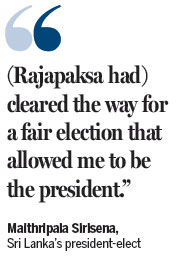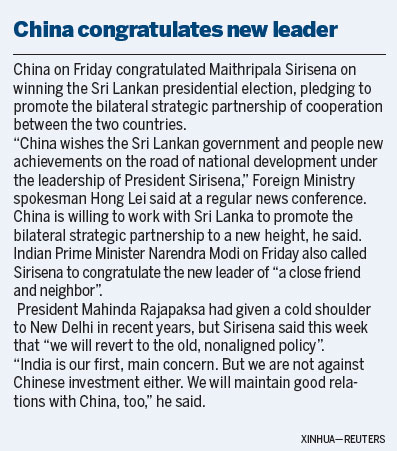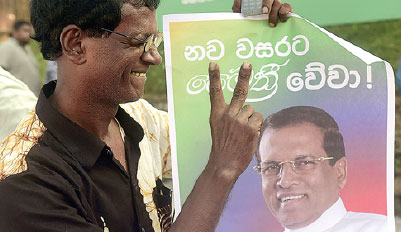Challenger elected in major upset
Incumbent president's unpopularity serves as springboard for former ally
In a stunning election result that was unthinkable weeks ago, Sri Lanka's long-time president acknowledged on Friday that he had been defeated by a onetime political ally, signaling the fall of a political dynasty and the rise of former Cabinet minister Maithripala Sirisena.
Sirisena, who defected from the ruling party in a surprise move in November, capitalized on the outgoing President Mahinda Rajapaksa's unpopularity among the country's ethnic and religious minorities, as well as grumbling among the Sinhalese majority about his growing power and the country's economic troubles.
Sirisena, 63, a longtime politician, was expected to be sworn in on Friday.
He thanked Rajapaksa on Friday for allowing a "fair" election that officials described as one of the most peaceful in the island's history. Sirisena said Rajapaksa had "cleared the way for a fair election that allowed me to be the president" as he formally accepted his victory at the election commissioner's office. The wider world was watching to see if the election was carried out fairly. So far, there were no signs of postelection violence.
Rajapaksa's defeat - as well as his quiet early-morning concession, leaving his official residence while votes were still being counted - came as a surprise in this nation of 21 million.
Rajapaksa had built up immense power after defeating the Tamil Tiger rebels in 2009, using his huge popularity with the Sinhalese majority who hailed him as a king.
Fierce political battle
Rajapaksa had been widely expected to easily win his third term in office until Sirisena suddenly split away in November, gathering the support of other defecting lawmakers and many of the country's ethnic minorities, turning the election into a fierce political battle.
Many Tamils were believed to have voted heavily for Sirisena not so much because they supported him but because they despised Rajapaksa.
Muslims, the second-largest ethnic minority, also appeared to have voted against Rajapaksa, who was accused of turning a blind eye toward anti-Muslim violence last June.
And for the country's Sinhalese, which make up about three-quarters of the population, Sirisena's entry into the race gave them another credible option if they were fed up with Rajapaksa or wary of his growing clout.
AP - AFP - Reuters - Xinhua


|
A supporter of Sri Lanka's main opposition candidate, Maithripala Sirisena, gestures with a poster as people celebrate in Colombo after President Mahinda Rajapaksa conceded defeat in the country's presidential election on Friday. Munir Uz Zaman / Agence France-Presse |
(China Daily 01/10/2015 page12)













